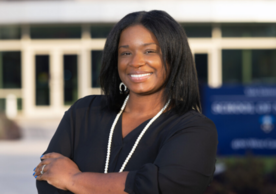
In a Q&A, Cayo, a nurse practitioner and an educator interested in classroom innovation, discusses her approach to teaching, her research, and more.
By Mallory Locklear
Sandy Cayo is a nurse practitioner, a Ph.D. candidate, and a professor at Yale School of Nursing. She can also now add “actor” to that list, after performing “Antigone” on a virtual stage with a cast that included Taylor Schilling, Keith David, and John Turturro.
We recently caught up with Cayo for the latest edition of Office Hours, a Q&A series that introduces Yale newcomers to the broader university community.
Title: Assistant Professor in Nursing and Director of Graduate Entry Prespecialty in Nursing (GEPN) Excellence
Research Interest: How psychosocial factors impact cardiovascular health in African American patients
Prior Institution: New Jersey Hospital Association
Started at Yale: July 1, 2022
You’re currently pursuing a Ph.D. How would you describe your dissertation research project?
Sandy Cayo: I’m looking at cardiovascular health in African American patients and how psychosocial factors, such as discrimination and stress, impact them.
What are your goals as director of GEPN Excellence?
Cayo: My focus is on the transition to practice for students and ensuring success through NCLEX [National Council Licensure Examination] and their state licensure exams. NCLEX is changing, so my role is also to help facilitate that transition for faculty as well as students so that they can be successful on the exams.
You’re also active on a series of global health projects. Can you describe those?
Cayo: In Haiti, I have two projects. One is HEAL Pignon, which is in partnership with the organization HEAL Haiti where I am the director of education. We developed a two-week-long residency program for nurses. The hope is that not only will it cement some of their skills but also help them with licensure, which is a real problem in Haiti. I’m also a volunteer associate professor at the University of Haiti.
In Ghana, I mostly work in the pediatric setting, working with an organization called the Amazing Grace Foundation to build a children’s hospital. And I’ve taken students to Ghana to do an oral health program and maternal-child health education.
I also partnered with an organization called Successful Steps to take five nursing students to Nigeria to do a clinical immersion. We did primary care and urgent care, and we were able to treat almost 1,000 patients.
How do you approach teaching?
Cayo: I really focus on classroom innovation. I just got a grant for a critical thinking project where students present a creative skit. We’ve had TikTok videos, live skits, Jeopardy! games. It really offers the students the opportunity to step into the seat of an educator — because all nurses are educators — and own part of a content area. The students have said they really get to know that subject matter and that it helps them as they prepare for exams and for practice. So I’ve done a lot of work around innovation in the classroom related to simulation theater. I love theater and I love integrating it into the classroom.
And you participated in some theater yourself recently.
Cayo: I worked with Theater of War on a project called “The Nurse Antigone,” which looks at how the Sophocles play “Antigone,” although written thousands of years ago, had so many connections to the experiences of nurses throughout the COVID-19 pandemic.
Theater of War was working with local nurses on the project, and I was connected to it through my chapter of the Greater New York City Black Nurses Association. There were so many points in the play in which I was like, “Wow, this is so relevant to nursing.” There’s one line that says, “And may we never forget what happened here,” and that was so poignant as we think about the COVID-19 pandemic and how it disproportionately impacted African American patients.
This article originally appeared in Yale News.
